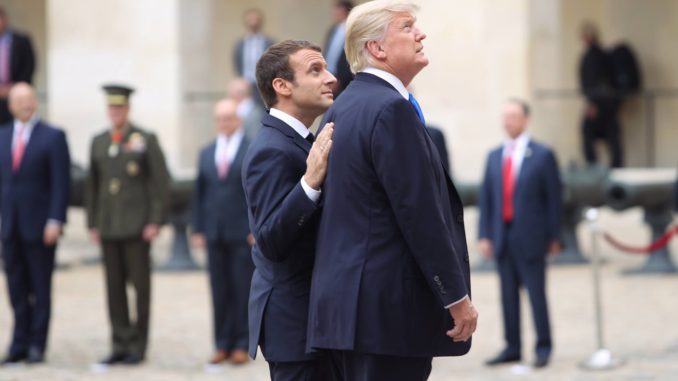
Guest Editorial By Don Sutherland
Before a Joint Session of Congress, French President Emmanuel Macron issued a powerful call for renewed American leadership in securing and advancing freedom. In doing so, he unequivocally rejected the toxic nationalism that has recently been tempting countries and peoples on both sides of the Atlantic, breeding internal divisions, and sapping vitality from free societies.
Macron observed that freedom is “the source of all that is worth living for.” It is what gives people dignity. It is the substance that gives life to prosperous and peaceful societies. “Freedom is a call to think and to love,” he continued. “It is a call to our will.”
Such understanding once pervaded the thinking of America’s post-World War II leaders. President Truman’s NSC-68, which articulated the purposes of American foreign policy explained:
The free society values the individual as an end in himself, requiring of him only that measure of self-discipline and self-restraint which make the rights of each individual compatible with the rights of every other individual…
From this idea of freedom with responsibility derives the marvelous diversity, the deep tolerance, the lawfulness of the free society. This is the explanation of the strength of free men. It constitutes the integrity and the vitality of a free and democratic system. The free society attempts to create and maintain an environment in which every individual has the opportunity to realize his creative powers.
In a June 9, 1982 speech before the West German Bundestag, President Reagan invoked similar themes. He explained that the United States and its allies sought to preserve “peace and freedom” through democratic governance, because such governance “allows for self-expression” and “respects man’s dignity and creativity.”
Macron then spoke of the world today. He told Congress, “Both in the United States and in Europe we are living in a time of anger and fear…” Those currents had sparked a rebirth of populist nationalism in the United States and nurtured increasingly illiberal governments in such countries as Austria and Poland.
He then put before the Congress perhaps the defining choice of the day in confronting the scourge of “anger and fear.” One option is “isolationism, withdrawal, and nationalism” while the other is strengthened “cooperation.”
He dismissed the first possibility as a policy dead end. That path only ensured that illiberal powers, countries such as Russia and Iran, would “fill the void we would leave empty.” That outcome would imperil the liberal order that was secured during World War II at tremendous sacrifice, sustained throughout the darkest days of the Cold War, and then advanced at the conclusion of that intense geopolitical rivalry.
“The only option then is to strengthen our cooperation,” Macron argued. The French President stated that such cooperation could establish a “21st century world order” that would be “based on a more effective, accountable, and results-oriented multilateralism.” To achieve that end, ongoing American foreign policy disengagement could not continue. Therefore, he appealed for a return to American leadership on the world stage by reminding the nation of some of its historic accomplishments from such enlightened engagement following the conclusion of World War II:
This requires more than ever the United States’ involvement, as your role was decisive for creating and safeguarding today’s free world. The United States invented this multilateralism. You are the one now who has to help to preserve and reinvent it.
Such a call is neither new nor unreasonable. In fact, it was once a self-evident responsibility assumed by the nation’s post-World War II Presidents. Reflecting such thinking, Reagan proclaimed in his 1982 speech in West Germany:
Let me assure you that the American commitment to Europe remains steady and strong. Europe’s shores are our shores. Europe’s borders are our borders. And we will stand with you in defense of our heritage of liberty and dignity.
Will the United States answer the French President’s call for renewed leadership? Will it rediscover Reagan’s notion of shared shores and borders that once bound the United States and Europe together as one united force for free peoples?
The stakes are high. Future generations will live with the consequences of the choices made today. “What we love is in danger,” Macron warned. “We have no choice but to prevail.”
